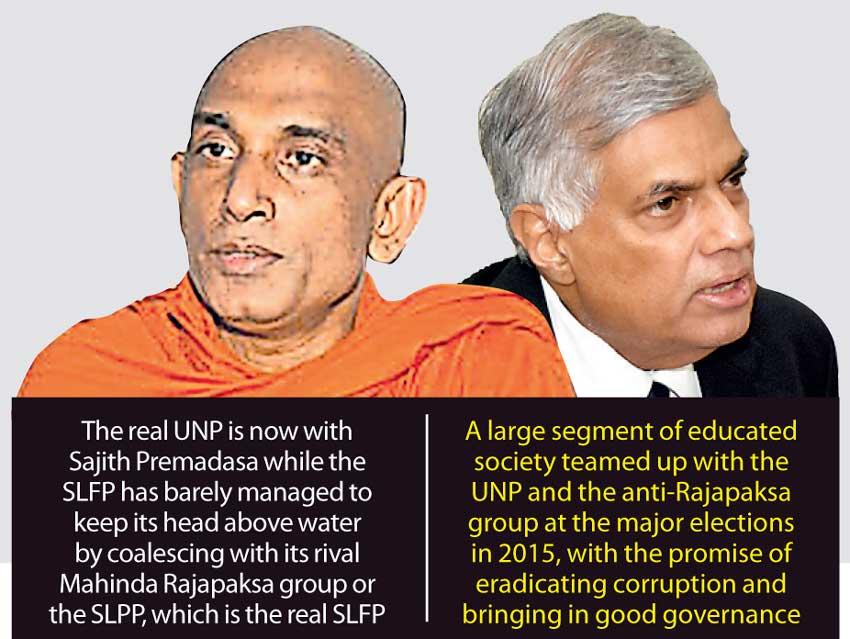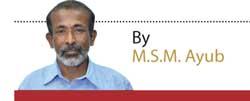19 Dec 2020 - {{hitsCtrl.values.hits}}

 The panic on the COVID-19 threat has totally eclipsed many issues that would have otherwise become hot issues. Main among them is Tamil nationalistic politics. Some others are the plight of the United National Party (UNP) and the bickering within the Ape Jana Bala Pakshaya or the Our Peoples Power Party (OPPP) led by Ven. Athureliye Rathana thera and Ven. Galagodaaththe Gnanasara Thera.
The panic on the COVID-19 threat has totally eclipsed many issues that would have otherwise become hot issues. Main among them is Tamil nationalistic politics. Some others are the plight of the United National Party (UNP) and the bickering within the Ape Jana Bala Pakshaya or the Our Peoples Power Party (OPPP) led by Ven. Athureliye Rathana thera and Ven. Galagodaaththe Gnanasara Thera.
The UNP which was the ruling party when Sri Lanka gained Independence and the OPPP, an unknown party until the previous parliamentary election had lost in all districts at that election yet managed to secure one national list seat each. But both the parties, one which was generally known as the Grand Old Party in Sri Lanka and the other which claimed to be the savior of the Sinhala Buddhist community in this country have pathetically failed to come out with a clear solution to the internal row over the appointment of a member to the solitary parliamentary seats they won.
OPPP General Secretary the Ven. Wedinigama Wimalatissa Thera had nominated himself for its national list slot and went underground. Later rumours had it that he had been abducted by other leaders of the party. He has not appeared thus far before the media to tell the world what really happened after he nominated himself to the slot. However, reports quoting National Election Commission said yesterday that Ven. Athureliye Rathana Thera, one of the leaders of the OPPP has been appointed as the party’s national list MP.
Political parties such as the OPPP suddenly emerge and as suddenly vanish. However, the plight of the UNP is such that one might wonder if the party has been forgotten by its leaders. It was a party that produced leaders such as J.R. Jayewardene and Ranasinghe Premadasa who had left indelible marks on the country’s history. Mr. Jayewardene turned the Sri Lankan economy upside down with his open economic policy and Mr. Premadasa who challenged even Britain by declaring Ambassador of that country “persona non grata” and Indian Prime Minister Indira Gandhi by asking her to invade Sri Lanka without supporting the Sri Lankan Tamil armed groups. Similarly, they had also made a drastic negative impacs on the country’s political culture. UNP has faced humiliating defeats at past elections as well. It was pushed to the third position with only eight seats in Parliament, even lower than that of the Lanka Sama Samaja Party (LSSP) in 1956, but emerged victorious at the next election in March 1960. However, the current collapse of the party seems to be permanent as its rank and file has left it and joined its former Deputy Leader Sajith Premadasa to form the Samagi Jana Balavegaya (SJB).
The 2020 parliamentary election was in a way a milestone in Sri Lankan electoral history. It almost wiped out the two traditional political parties – the UNP and the Sri Lanka Freedom Party (SLFP) that had ruled the country alternatively since Independence. Although the SLFP was not the official ruling party between 1994 and 2014, the party was the main constituent group in the coalitions that was in the saddle. Leaders of both parties were humiliated this time not because their supporters crossed over to the other camp but to the rival factions within the party which later emerged as separate parties.
Hence, the real UNP is now with Sajith Premadasa while the party’s signboard and a few supporters have been left with Ranil Wickremesinghe. The SLFP also faced the same fate but has barely managed to keep its head above water by coalescing with its rival Mahinda Rajapaksa group or the Sri Lanka Podujana Peramuna (SLPP) which represents the real SLFP. The Wickremesinghe faction’s electoral humiliation was immense that they did not appear in public for about four months, despite many politically important events taking place in the country.
They rarely heard now. A month after the parliamentary election, Ruwan Wijewardene was elected as the UNP’s Deputy Leader. Akila Viraj Kariyawasam had resigned as the General Secretary of the party and the vacancy filled by Prasanna Shamal Senarath. Mr. Wickremesinghe had spoken at a meeting recently in which according to the media he had warned about taking an tested syrup for COVID-19. That’s all. There were so many opportunities such as the passage of the 20th Amendment to the Constitution and the 2021 budget to show the country that they are still a force to be reckoned with or at least, that they are still a living entity.
They must take a leaf out of the book of Mahinda loyalists if they still believe that they could bounce back. Days after Mahinda Rajapaksa’s defeat at the 2015 presidential election, the former president’s loyalists organized processions to Medamulana to visit Rajapaksa and wide publicity was given to those large scale visits which were portrayed as voluntary pilgrimages by the supporters. Then within weeks they conducted “Mahinda Sulanga” meetings starting from Nugegoda with the slogan “Mahinda Samaga Negitimu” (Rise with Mahinda). They continuously held news conferences on a daily basis – sometimes two or three a day -- even at the drop of a hat. It worked, especially with the media support and failure on the part of the UNP-led government in addressing the issues faced by the people and the exposure of its so-called anti-corruption drive.
If in fact the UNP leaders resort to a genuine introspection to find out what really went wrong, they have to study their administration between 2015 and early 2018 when the first indication of a Rajapaksa comeback was clearly visible at island-wide local government elections. The events took place immediately before the recent parliamentary election would not provide a correct picture, as the 2018 local government election results had already been a trend setter.
A large segment of educated society teamed up with the UNP and the anti-Rajapaksa group at the major elections in 2015, with the promise of eradicating corruption and bringing in good governance. The UNP totally disappointed the people by allowing a massive fraud in the Central Bank and attempting to cover-up and defending it, leave alone taking action against past corruption. UNP’s dismal failure in sensing the pulse of the people was another serious issue. They promised to create one million employment opportunities in five years and before the LG polls claimed that 400,000 jobs had been given to youth during the past three years, without completing a single factory or any other work place during those three years.
The attribution of lack of support by the Sinhala Buddhists to the UNP’s present predicament seems to be unfounded. The party had increased its vote bank by two million votes at last year’s presidential election, since the 2018 LG polls, without any change in the political behavior of the minority communities.
The UNP could make a good start by filling its national list slot with the appointment of a vibrant, dynamic, untainted (if any) and educated person, who understands the pulse of the people and be aggressive when necessary. Nevertheless, a genuine collaboration with the SJB might be more fruitful since it is the SJB that possesses the UNP’s vote bank.
30 Nov 2024 2 hours ago
30 Nov 2024 4 hours ago
30 Nov 2024 5 hours ago
29 Nov 2024 29 Nov 2024
29 Nov 2024 29 Nov 2024